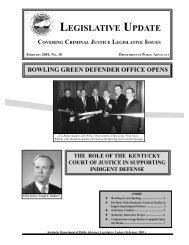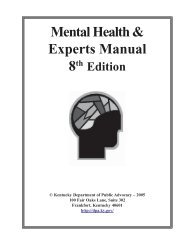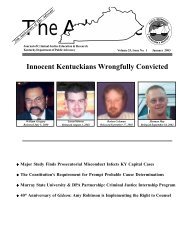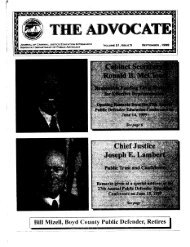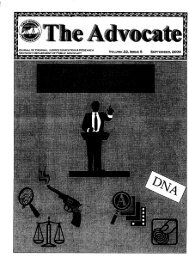May 2002 - Department of Public Advocacy
May 2002 - Department of Public Advocacy
May 2002 - Department of Public Advocacy
You also want an ePaper? Increase the reach of your titles
YUMPU automatically turns print PDFs into web optimized ePapers that Google loves.
Continued from page 35<br />
promises that you made by raising your hand taking the oath,<br />
that you would deliberate upon a verdict, to try and reach a<br />
verdict. And we told you at the outset it would not be an<br />
easy task, but we know you can rise to the occasion.” One<br />
hour after giving the instruction, the judge dismissed the<br />
jury for the day.<br />
The next morning, Pitts moved for a mistrial, arguing that the<br />
supplemental instruction was coercive. As he was arguing,<br />
the jury returned with its verdict. The Michigan state courts<br />
denied relief on this issue.<br />
It is undisputed that “the complete denial <strong>of</strong> counsel during<br />
a critical stage <strong>of</strong> a judicial proceeding mandates a presumption<br />
<strong>of</strong> prejudice.” Roe v. Flores-Ortega, 528 U.S. 470, 483<br />
(2000). A supplemental jury instruction is a “critical stage” <strong>of</strong><br />
a trial. Rogers v. U.S., 422 U.S. 35 (1975). The absence <strong>of</strong><br />
counsel during a critical stage <strong>of</strong> trial is per se reversible<br />
error. U.S. v. Cronic, 466 U.S. 648, 666 (1984). “The existence<br />
<strong>of</strong> [structural] defects—deprivation <strong>of</strong> the right to counsel,<br />
for example—requires automatic reversal <strong>of</strong> the conviction<br />
because they infect the entire trial process.” Brecht v.<br />
Abrahamson, 507 U.S. 619, 629-630 (1993).<br />
Instructions to Deadlocked Jury<br />
Should Not be Coercive and<br />
Ideally Should Follow ABA Model Instruction 5.4<br />
The 6 th Circuit also notes that the trial court’s supplemental<br />
instruction was inappropriate “and likely had a substantial<br />
and injurious influence on the jury’s verdict.” The trial court<br />
should have continued to use the Michigan standard jury<br />
instruction, which was based on ABA standard jury instruction<br />
5.4. This instruction specifically “minimize[s] any coercive<br />
effect <strong>of</strong> jury instructions.” In particular the model jury<br />
instruction reminds jurors “they should not give up their<br />
honest convictions solely because <strong>of</strong> the opinion <strong>of</strong> the other<br />
jurors or in order to reach a verdict.” The Court notes that<br />
the giving <strong>of</strong> this supplemental instruction is especially troubling<br />
because it was the third such instruction given and it<br />
varied dramatically from the initial instructions. The omission<br />
<strong>of</strong> the “honest convictions” language “risks the jurors<br />
believing their responsibilities have changed.” Furthermore<br />
this omission “was amplified by the trial judge telling the<br />
jurors three separate times they took an oath to reach a verdict.”<br />
Finally, “the time line <strong>of</strong> the jury’s deliberation suggests<br />
that the third supplemental instruction had an effect.”<br />
Only after receiving the third jury instruction with its harsh<br />
language was the jury able to reach a verdict.<br />
U.S. v. Aparco-Centeno<br />
280 F.3d 1084 (6 th Cir. 2/14/02)<br />
Pro<strong>of</strong> <strong>of</strong> Prior Convictions Will<br />
Remain a “Sentencing Factor,”<br />
Not an Element <strong>of</strong> the Crime,<br />
Until the U.S. Supreme Court Says Otherwise<br />
THE ADVOCATE Volume 24, No. 3 <strong>May</strong> <strong>2002</strong><br />
This case is only important for our purposes so far as it<br />
emphasizes that until the U.S. Supreme Court decides to the<br />
contrary, the 6 th Circuit will continue to interpret Apprendi v.<br />
New Jersey, 530 U.S. 466 (2000), as not requiring pro<strong>of</strong> <strong>of</strong> a<br />
prior conviction beyond a reasonable doubt as an element <strong>of</strong><br />
the crime. The U.S. Supreme Court in Apprendi declined to<br />
overrule Almendarez-Torres v. U.S., 523 U.S. 224 (1995), an<br />
earlier case that characterized the determination <strong>of</strong> a prior<br />
“aggravated felony” as a sentencing factor, so the 6 th Circuit<br />
cannot.<br />
U.S. v. Orlando and Daniels<br />
281 F.3d 586 (6 th Cir. 2/25/02)<br />
This case involves charges <strong>of</strong> prostitution and money laundering<br />
in connection with the operation <strong>of</strong> a business called<br />
“Dawn’s Whirlpool and Massage.” The majority <strong>of</strong> the opinion<br />
deals with various federal law issues that are not <strong>of</strong> concern<br />
to the state court practitioner. All this summary will<br />
address are the allegations involving jury irregularities.<br />
New Trial Not Required Despite Numerous Allegations <strong>of</strong><br />
Improper Influence on Jury and Jury Irregularities<br />
The day after the verdict was returned, one <strong>of</strong> the jurors,<br />
Kimberly Wade, contacted defendant Orlando and informed<br />
him <strong>of</strong> various instances <strong>of</strong> jury misconduct, including the<br />
possibility that the verdict obtained against Orlando was not<br />
unanimous and that some <strong>of</strong> the jurors read the newspaper<br />
while deliberating. Orlando promptly filed a motion for a<br />
post-verdict hearing. A hearing occurred, and Wade appeared<br />
for questioning. Her testimony focused on nine instances <strong>of</strong><br />
extraneous jury influences: (1) newspapers containing articles<br />
about the case that were brought into the jury room; (2)<br />
discussion <strong>of</strong> a business located next to Dawn’s called “The<br />
Chamber” where sadomasochistic sexual acts occurred; (3)<br />
police statements that were related to the jury by jury<br />
foreperson Joseph Martin, including that several <strong>of</strong>ficers told<br />
him that clients at Dawn’s received more than massages; (4)<br />
a TV program called “Sin City” that was watched by several<br />
jurors; (5) a jury administrator’s comment that a verdict was<br />
preferable to a hung jury; (6) relationships between several<br />
jurors and a Dr. Richard Feldman, who was involved in the<br />
investigation <strong>of</strong> Dawn’s; (7) visits to The Tennessean newspaper<br />
website; (8) foreperson Martin’s statements regarding<br />
the defense trial strategy and mistrial requests made during<br />
times when the jury was not present; and (9) Martin’s comments<br />
regarding evidence not presented at trial, including<br />
names <strong>of</strong> Dawn’s clients and the fact that Orlando was under<br />
house arrest. A Remmer hearing, Remmer v. U.S., 347 U.S. 227<br />
(1954), occurred where the court heard testimony from all <strong>of</strong><br />
the jurors, from 3 alternates, and from Martin’s wife. The<br />
district court denied the motion for a new trial, holding that<br />
Ms. Wade’s “allegations either lack credibility; or that no<br />
prejudice to Defendants resulted from juror exposure to extraneous<br />
information.”<br />
Actual Bias as a Result <strong>of</strong> Extraneous Jury Influence<br />
Must be Shown to Warrant a New Trial<br />
36



